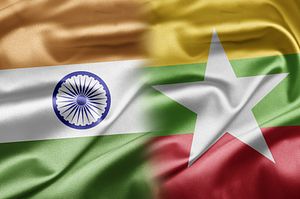Even as democracy continues to flounder in neighboring Thailand, Myanmar registered a monumental event last week, when it swore in its first democratically elected civilian president in over five decades. To be sure, this isn’t the end of the struggle for democracy in Myanmar. The country’s laws still reserve key subjects of governance – including home, defense, and border affairs – for military representatives, who still occupy a quarter of the seats in Parliament under statutory requirements. And laws also prevented democratic icon Aung San Suu Kyi from becoming president, forcing her to appoint a close aide, Htin Kyaw, to that post instead.
No country in the region would be more keenly interested in Myanmar’s progressive transition to democracy than neighboring India. India’s relationship with Myanmar’s erstwhile army junta was perennially caught in the dilemma between its own democratic conscience and the need to keep Myanmar from falling into China’s sphere of influence. Now that Myanmar finally has a civilian government of its own, India will be hopeful of progress on a number of fronts, “free from residual baggage of the past,” as India’s ambassador Gautam Mukhopadhaya has put it.
Myanmar forms the geographical link between India and Southeast Asia, and is therefore a vital component of Prime Minister Narendra Modi’s “Act East” policy. As India seeks to strengthen trade and cooperation with the Far East, Myanmar would have to play along. For example, both countries are part of the Bangladesh-China-India-Myanmar (BCIM) corridor – an infrastructure project which connects Kolkata with Kunming through the four countries. And successful trade links along this route could also bring investment opportunities to India’s impoverished and restive northeastern region. It was along these lines that India developed the port of Sittwe on Myanmar’s southwestern coast.
Given these long-term commitments, New Delhi will be hoping that Myanmar’s new civilian government can bring greater stability to a country that has seen much unrest over the decades. Prime among these challenges is the politically sensitive issue of Rohingya statehood. Last year, a refugee crisis involving the Rohingyas spread panic across the region, after boats carrying hundreds of refugees were found floating in the sea.
Many of these refugees also fled to India. According to one report in The Quint, there are an estimated 36,000 Rohingya refugees presently located in India. And as the crisis continues unsolved, that number is only likely to climb. For India, the Rohingya problem is made further significant by the fact that many of them occupy Rakhine province – home to Sittwe.
Suu Kyi has thus far been reluctant to make direct and open commitments toward the resolution of the Rohingya crisis, fearing a possible political backlash at home. But as her new government matures in office, New Delhi’s patience on the affair is likely to wear thin, considering the crisis’ implications for its own national interests.
The Rohingya problem apart, India would also want the new Myanmar government to help with tackling border insurgency, and hope for its cooperation in the eradication of militant camps along the Indo-Myanmar border. India’s restive northeast shares a long forested border with Myanmar, used as a hideout by secessionist insurgents operating on the Indian side. Last year, New Delhi nearly had a diplomatic row with Myanmar, after the Indian army was alleged to have crossed the international border in its bid to exterminate militants. The operation was successful, but it didn’t do much to eradicate the problem. India still believes that many of its most wanted men have their hideouts inside Myanmar.
While India would hope for cooperation on these and other issues, Suu Kyi would stand to benefit greatly from closer ties with New Delhi too, as she maintains a tenuous balance with the military. Myanmar would stand to gain, for one, from Indian business investments. Despite being rich in resources such as natural gas, Myanmar remains woefully poor and its economy morbid. About 70 percent of its population has no access to electricity, according to a report in Time. All of this can gradually change if investments start pouring in from across the border.
But above all, Suu Kyi would want New Delhi’s support in her bid to advance democracy in Myanmar. There is no denying a trust deficit between the two sides; India has always been an ardent supporter of democratic values, but it went back on its word in Myanmar in the early 1990s, when then-Prime Minister Narasimha Rao thought it more expedient to engage with the ruling junta. “It’s saddened me that India, the largest democracy in the world, was turning its back on democracy in order to maintain good relations with the military government,” Suu Kyi said last year of India’s shift in foreign policy at the time.
Whatever its past policy, however, India would be delighted to have a civilian partner to work with in Myanmar. This is a golden chance for the two countries to build their path forward.
Mohamed Zeeshan is a policy analyst based in Bangalore, India and a columnist for The Huffington Post and Swarajya.

































